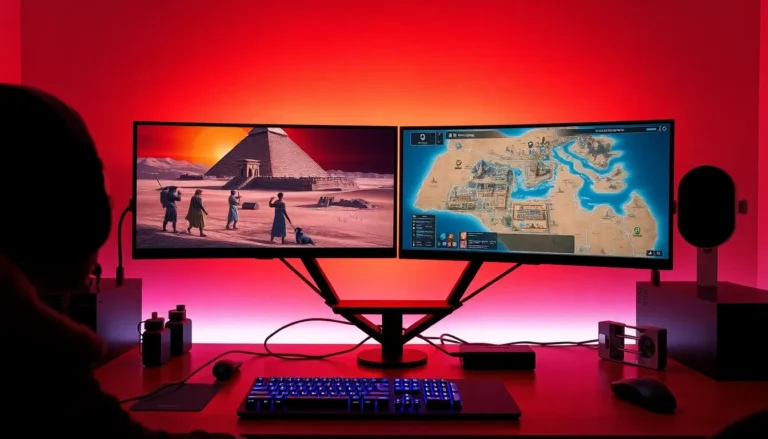Imagine a world where competitive gamers can focus solely on their craft without worrying about the financial burden of tournaments and training. That world is becoming a reality, thanks to esports grants. These grants are like treasure chests hidden in the gaming universe, waiting to be unlocked by aspiring gamers and teams. With funding options that can support everything from training facilities to event hosting, esports grants are ready to level up the competitive gaming landscape. If you’re serious about joining the ranks of professional gamers, understanding grants is your first step to unlocking the next level.
Table of Contents
ToggleUnderstanding Esports Grants

Esports grants are financial awards aimed at promoting and enhancing the gaming ecosystem. They can come from various sources, including government bodies, private organizations, and even corporations looking to invest in future talent. Understanding the dynamics behind these grants is essential for anyone interested in pursuing a career in esports.
These grants often serve dual purposes: they not only provide financial aid but also foster community development and support initiatives that encourage participation in competitive gaming. From educational programs to tournament sponsorships, the landscape of esports funding is rapidly expanding. Understanding the types of available grants can help competitors, organizations, and educational institutions tap into this resource effectively.
Types of Esports Grants Available
When exploring the realm of esports grants, one quickly realizes that not all grants are created equal. Here are some of the primary types:
Education Grants
These grants support schools and universities in developing esports programs. They often cover costs such as equipment, facility upgrades, and scholarship funding for aspiring gamers.
Tournament Grants
Organizations and leagues may provide grants to host or participate in events. These can include funds for venue rentals, prize pools, and logistics.
Development Grants
Focused on improving skills and training, development grants provide resources for players, coaches, and teams to refine their craft. This category may also include support for mental health services or coaching education.
Community Grants
These initiatives often target grassroots organizations looking to build local esports programs. Grants can help establish youth leagues, community tournaments, and educational workshops, fostering a sense of camaraderie and competitiveness.
How To Apply For Esports Grants
Applying for esports grants may seem daunting, but it’s often a straightforward process once you know what to expect. Here’s a step-by-step guide:
- Research Thoroughly: Identify which grants align best with your needs. Each grant will have different eligibility criteria and requirements.
- Gather Required Documentation: Be prepared to showcase your project or team’s accomplishments, budget, and its potential impact. The more organized your application, the better your chances.
- Write a Compelling Proposal: This is your chance to shine. Describe how the grant will enhance the esports community or benefit your team. Include data, testimonials, and a clear budget outlining funding needs.
- Submit and Follow Up: After submission, keep track of your application status. If possible, connect with the grantor to express your enthusiasm.
- Prepare for Accountability: Should you receive funding, be sure to follow through on reporting requirements and fulfill the objectives outlined in your proposal.
Benefits of Receiving Esports Grants
The advantages of receiving esports grants can’t be overstated. Here’s a breakdown of the most significant benefits:
- Financial Relief: For many aspiring gamers and teams, grants eliminate financial hurdles, allowing them to focus on gaming rather than funding.
- Access to Resources: Grants often provide connections to mentoring programs, training workshops, and networking opportunities that can have long-lasting impacts on a player’s career.
- Community Growth: By supporting local games and programs, grants contribute to stronger community ties and promote inclusivity within esports.
- Enhanced Credibility: Obtaining a grant can enhance a team’s or organization’s reputation, making it easier to attract sponsors and additional funding in the future.
Challenges and Considerations in Esports Funding
Even though the various benefits, pursuing esports funding does come with challenges:
- Highly Competitive: Like any funding opportunity, the competition for esports grants can be fierce. Many applicants vie for limited resources, making it essential to stand out.
- Complex Requirements: Each grant can have different and often strict application processes. Understanding the nuances can make or break an application.
- Sustainability Questions: While grants can provide initial funding, it’s crucial to consider how to maintain operations and initiatives in future years without relying solely on grants.
- Potential Misalignment: Sometimes, a grantor’s vision might not completely align with a team’s mission, leading to conflicts or unexpected requirements.
Future Trends in Esports Grants
Looking ahead, several trends are expected to influence the landscape of esports grants:
- Increased Corporate Sponsorship: As more companies recognize esports’ popularity, they are likely to invest significantly in grants, fueling growth at both community and professional levels.
- Greater Focus on Inclusivity: There’s a growing movement to make competitive gaming accessible to a broader audience. Grants aimed at underrepresented groups may become more commonplace, helping diversify the community.
- Innovative Funding Models: Creative funding solutions, including crowdfunding and blockchain, may emerge, allowing grassroots initiatives to thrive in new ways.
- Educational Partnerships: As esports becomes more recognized as a legitimate field of study, educational grants will likely increase, supporting academic programs focusing on gaming, management, and technology.









